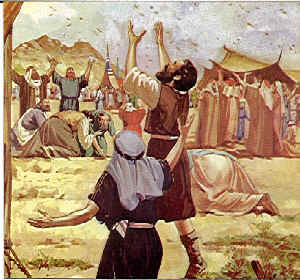 To download a pdf version of this piece click here.
To download a pdf version of this piece click here.Disengagement? From Gush Katif? When was that – 2005? In our media-driven, twenty-four-seven culture, five years ago seems like ancient history. Do we have to keep talking about it? Can't we move on?
Not where I live.
In Yad Binyamin, the town where I settled with my family, you can't really allow yourself to forget the expulsion from Gush Katif, because the former residents of Gush Katif not only play a central role in the life of the yishuv. They literally live in the center of the yishuv.
While Yad Binyamin has experienced fantastic growth over the last four years, that growth was built around a ring of caravillot – caravan homes – that circle the center of the yishuv. Every day as I leave home for work; every time I jog near my house; every morning as my children ride their bikes to school - we pass by temporary homes, filled with residents waiting for permanent housing. Still. The gentleman with whom I share a row in shul and see every Shabbat just started to build his home last month. Really.
Whatever your position about the expulsion from Gush Katif – and it's safe to say that most people reading this piece were/are against – we must remember that political and government decisions affect real people. Whether abandoning Gaza was a good military and political decision or a bad one, real people lost their homes. Thousands of people lost their jobs. Thousands of children found themselves uprooted, unsure and confused. And whether we intended to harm those people or not, it was incumbent upon us to ask ourselves how the government's decisions would affect them, and then take steps to mitigate that harm to the greatest possible degree.
No less than Moshe Rabbeinu learned this lesson from Yitro is this week's Sedra.
After welcoming his father-in-law with a celebratory banquet and regaling him with tales of the miraculous Exodus from Egypt, Moshe had to get back to work. Imagine his "joy" when Yitro decided to accompany him. (Can you imagine bringing your in-law to work with you?) Yet, when Yitro witnesses Moshe in action, he offers valuable constructive criticism.
As we all know, Moshe tried to judge the people alone, attending individually to their needs. Yet, Yitro worried not only about Moshe's ability to perform the task, but also how his actions would affect the people. Explaining the words נבל תבול, Chizkuni writes,וַיֹּאמֶר חֹתֵן מֹשֶׁה, אֵלָיו: לֹא-טוֹב, הַדָּבָר, אֲשֶׁר אַתָּה, עֹשֶׂה. נָבֹל תִּבֹּל--גַּם-אַתָּה, גַּם-הָעָם הַזֶּה אֲשֶׁר עִמָּךְ: כִּי-כָבֵד מִמְּךָ הַדָּבָר, לֹא-תוּכַל עֲשֹׂהוּ לְבַדֶּךָ.And Moshe's father-in-law said to him: 'The thing that you're doing is not good. You will surely wear away, both you, and this people that is with you; for the thing is too heavy for you; you cannot do it alone.
This is a language of confusion, as in "and confound their language" (Bereishit 11:7) – meaning that in this matter both you and they will become confused. One person will yell, "Listen to me, my master!", and another will follow suit. You won't know whom to answer, for you won't know what they're saying, and they won't know what you're saying.Undoubtedly Moshe was trying his best. He figured that as he served as the closest link to God, he would be the best person to guide the people and answer their questions. He was right. He would be the ideal person to speak to. But Yitro realized that you can't always have what's best. You also have to worry about what will work and how the decisions that you make affect not only yourself, but the people that are counting on you.
Writing about the "Disengagement"/"Expulsion" is tricky business. Here in Israel especially, it's a painful, highly charged political topic that has the power to instantly alienate and upset, understandably so.
Yet, whatever our political perspective on the Disengagement, we must take to heart the fact that we did not properly account for the fundamental upheaval that the residents of the Gush would soon undergo – both in the short term, and even now, years later. We must look back now and see the pain that they still feel, not just from the Disengagement, but from the feeling of abandonment both on the part of the government certainly, but even from us – the rest of the Jewish people, who have in a real way "moved on."
We might have "moved on" but they have not – still living in their caravillot, looking for jobs, managing their families. The Disengagement affected real people, causing real pain, struggle and difficulty, that continues to this day.
And that's a lesson that we must take to heart today, almost five years later.




















